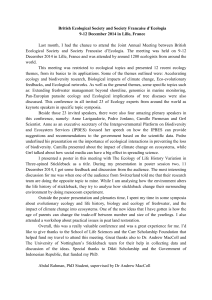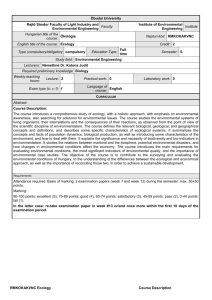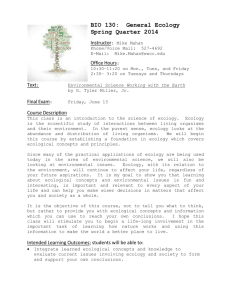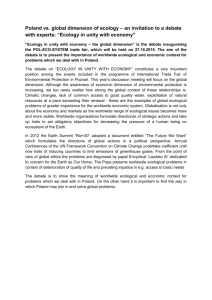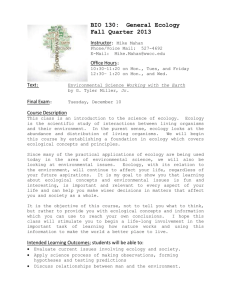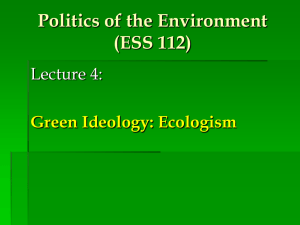Link to word file
advertisement
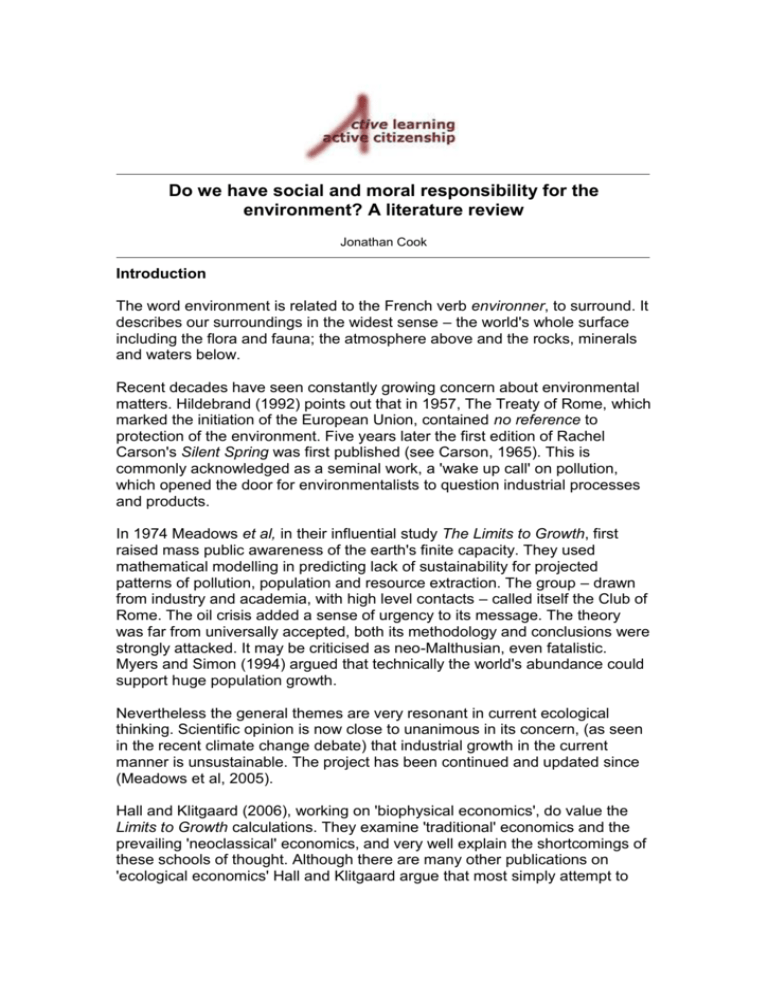
Do we have social and moral responsibility for the environment? A literature review Jonathan Cook Introduction The word environment is related to the French verb environner, to surround. It describes our surroundings in the widest sense – the world's whole surface including the flora and fauna; the atmosphere above and the rocks, minerals and waters below. Recent decades have seen constantly growing concern about environmental matters. Hildebrand (1992) points out that in 1957, The Treaty of Rome, which marked the initiation of the European Union, contained no reference to protection of the environment. Five years later the first edition of Rachel Carson's Silent Spring was first published (see Carson, 1965). This is commonly acknowledged as a seminal work, a 'wake up call' on pollution, which opened the door for environmentalists to question industrial processes and products. In 1974 Meadows et al, in their influential study The Limits to Growth, first raised mass public awareness of the earth's finite capacity. They used mathematical modelling in predicting lack of sustainability for projected patterns of pollution, population and resource extraction. The group – drawn from industry and academia, with high level contacts – called itself the Club of Rome. The oil crisis added a sense of urgency to its message. The theory was far from universally accepted, both its methodology and conclusions were strongly attacked. It may be criticised as neo-Malthusian, even fatalistic. Myers and Simon (1994) argued that technically the world's abundance could support huge population growth. Nevertheless the general themes are very resonant in current ecological thinking. Scientific opinion is now close to unanimous in its concern, (as seen in the recent climate change debate) that industrial growth in the current manner is unsustainable. The project has been continued and updated since (Meadows et al, 2005). Hall and Klitgaard (2006), working on 'biophysical economics', do value the Limits to Growth calculations. They examine 'traditional' economics and the prevailing 'neoclassical' economics, and very well explain the shortcomings of these schools of thought. Although there are many other publications on 'ecological economics' Hall and Klitgaard argue that most simply attempt to bolt together the two disciplines. Their main argument revolves around the exclusion of energy from most economic analyses. The mechanisms of environmental destruction were further explained by Susan George (1988). She pointed to transnational companies exploiting lower pollution controls in developing countries, and powerful land grabs forcing out unemployed people to then subsist in environmentally sensitive areas. The year 1992 saw a historic global recognition of environmental problems. At the United Nations Conference on Environment and Development meeting in Rio de Janeiro, the 'Earth Summit', Agenda 21 was published. This is a multilevel plan of action for sustainability in most areas of human-environment interaction. Implementation at national and local level was voluntary and incomplete but the impact of such a worldwide statement remains strong. Environmental debate and concern continues, with the focus shifting over time from the ozone layer, biodiversity and extinction, to global warming, (thoroughly covered by Monbiot, 2006). Despite the growing understanding of the link between ecology and economics, there are still voices of denial, as Shiva (1992:192) observes, economists 'slumber', or worse still use the idea of sustainable development in a hypocritical way, unwilling to radically alter direction. Historical ideas about social and moral responsibilities, and the environment Coverage in the popular press generally frames environmental damage as a practical problem, without entering more deeply into ethical implications. There is, however, a considerable literature on social and moral responsibility in this area. Rules have traditionally been expressed in religious terms. Many cultures ‘atone’ for damage to the environment, for example with ritual prayers surrounding the killing of an animal. This may be based on beliefs about the animal’s soul, or the nature of creation as a whole, but the result is generally a respectful rather than a destructive approach. Engel and Engel (1990), in a wide summary of the issues, go beyond Eurocentric views. They offer African, central and south American, Buddhist, Hindu, Islamic, Jewish and Taoist perspectives. The idea that 'progress' is destroying the planet, and actually taking humanity away from an earlier golden age runs through some streams of 'green' thought. Rural landscapes and quieter, slower ways of life continue to disappear, and the most extreme reaction, termed 'Catonism' by Moore (1974), is a romantic idealisation of peasant lifestyles as superior to modern ones. The term is actually a reference to Marcus Porcius 'Censorius' Cato, of the 2nd century BCE. This reflects how old in the human psyche is nostalgia for earlier pastoral society, indeed the Biblical story of the expulsion from the Garden of Eden probably owes its origins to the growth of early cities and the consequent destruction of rural ways of life. Weizsäcker (1988, p23) describes the European heritage as a combination of Greek thought, Christianity and Roman jurisprudence. To take the first of these, Passmore (1974) credits the ancient Greek Stoics with the original idea that humanity is in a position of exploitative power over nature, sometimes even in combat with it. (On the other hand Epicurus, in the third century BCE, acknowledged that animals feel pleasure and pain in the same way as humans). The exploitative ‘dominion’ notion can be found in Christianity, but as Attfield (1983) shows there is a diverse range of Biblical references on the matter, particularly in the Old Testament. Along with Passmore, he concludes that humanity’s stewardship over creation is the dominant Judeo-Christian environmental message. (This is not accepted by White (1967), for example, who attributes environmental degradation almost entirely to the Western value system, originating in Christianity). Attfield (1983) notes ancient Greek references to periods of advancement, but with European Enlightenment writers like Leibniz came progress seen as an inevitability (Passmore, 1970). Enlightenment thinking brought a 'disenchantment' of the world. Various previous religio-spiritual notions were rejected; angels were no longer counted; inanimate objects were no longer thought to have 'spirits'. The protestant concept of a personal relationship with God was differentiated from earlier, more collective practices of worship. 'Exclusive humanism' saw nothing wrong in exploitation of the world at the service of 'man' (sic) because only man had the capacity to reason. Science had a flourishing new capacity to increase the fullness of human life, and as Attfield (1983) explains, writers like Bacon and Descarte reflected this in the new outlook on the natural world. Taboos, fears and superstitions faded. The world was explored by Europeans looking for new cures, new wonders and new products in general. Experimentation on animals flourished. Spinoza (1677/2004:100) saw animal protection laws as 'empty superstition and womanish compassion'. Modern outlooks developed up to the dawn of environmentalism, from the early Enlightenment views, outlined for example by Hampson (1979). All of knowledge can be approached by man (sic), as reason and investigative work towards a comprehensive scientific understanding of the world. It is an anthropocentric (human-centred) world-view, and presupposes (as an aim at least) the best of all possible worlds for humanity. The contribution of Darwin's On the Origin of Species (1859) advanced scientific understanding, and may have instigated in Kuhn’s (1962) terms another paradigm shift – reconnecting humanity's conception of itself back within the natural order (albeit at the top of a hierarchy). The similarly influential work of Marx (1867) added to the idea of ongoing progress in human society. Marx was, however, acutely aware of industrialisation's pollution and resource depletion at the hands of profit-maximising capital. As populations rose, Europe’s deforestation even in pre-industrial times was noted as human intervention in environmental processes, supporting the concept of human stewardship of nature. Industrialisation saw the roots of modern ecological ideas in the nineteenth century, traced in Bramwell’s (1989) Ecology in the 20th Century. Social responsibility and the environment Social responsibility is the imperative to act for the good of society (or conversely to avoid socially harmful actions). It may be applied in varying measures to individuals, organisations or even governments. Exactly what is good is debatable of course, and depends on circumstances. Strictly speaking something which is apparently good for people may be bad for the environment, but this dichotomy is no longer generally accepted as a legitimate one. There is an acceptance that the two interests must be balanced, and separation of the two was a Western way of thinking which allowed destructive environmental exploitation, according to Shiva (1992). Since the 1970s the term ‘Corporate Social Responsibility’ (CSR) has been increasingly accepted into voluntary and legislative accounting frameworks, to describe the ethical and environmental awareness and practices of businesses (Farmer and Hogue, 1973). In this sense responsibility goes beyond the usual legal requirements, and beyond the economic duty to shareholders. The negative injunction to companies by neo-liberal writer Milton Friedman was to essentially refrain from social concerns, summed up in his title The social responsibility of business is to increase its profits (Friedman, 1970). He argued that profitable business enabled a wealthy society in which (only) individuals should decide to act on ethical motivations. In opposition to this argument CSR states that duties to other stakeholders should be recognised, including those far away who may be affected by corporate decisions. The Fair Trade movement is one example of social responsibility in action (Zaccaï 2007). It gives contracted suppliers in the developing world a better deal than the disadvantageous terms usually available on the world market. Certified products from regularly inspected producers sell for a price which allows for investment in sustainable practices and local projects, for social, environmental or economic improvements. Moral responsibility and the environment The concept of moral responsibility is wider than that of social responsibility; it incorporates the philosophy of ethics. It hinges on praise or blame for actions, or duty to act in a certain way deemed intrinsically, ‘rationally’, correct. Who defines correctness, and how, is only one of the problems which have occupied philosophers since Aristotle. One division was between deontological moral codes (the ‘science’ of duty), and theologically determined religious authorities. Both of these posit an essentially abstract moral code which is assumed to exist in the heart of responsible, capable adults, perhaps in an identical way for each person. Moral choices are said to be made by moral ‘agents’, free to act and capable of distinguishing right from wrong. As with social responsibility, this can arguably be extended to corporate bodies (Feinberg, 1970). In 1962, Strawson suggested that over-intellectualized debate had obscured the reality that moral codes were actually socially constructed. Moral condemnation or otherwise could vary according to circumstances. This has a direct impact on environmental actions. For example, it may be deemed less bad for a poor country to use essential fossil fuels than a rich one, which has been a high polluter in the past and can now afford alternative choices. Accepting the general principle of responsibility to others, social or moral, does not imply that it must stay within geographical or temporal limits. It can include those far away, and presumably those in generations to come (Gower, 1992). This is a very relevant concern when planning nuclear programmes or other potentially polluting activities. Although questions of cause and effect are unpredictable in any detail, the principle remains important; we have a responsibility to consider the future in current environmental decisions. In Kothari's graphic terms (1990), we are colonizing the future. Environmentalism Environmentalism is a concerned viewpoint, not a complete political ideology; it does not need dogmatic presumed 'truths' to criticise or prescribe cures for environmental ills, rather these can be 'bolted on' to improve society. It has inspired many people to see nature as something to cherish, but is strongly criticised as 'greenwash' to permit continuing environmental damage with small, token repairs. (Carter, 2001; Connelly and Smith, 2003). Ecologism Dobson (2000), in a book first published in 1990, differentiates 'ecologism' as a current, radical political ideology as distinct from mere managerial 'environmentalism' – whether 'radical' or 'reformist'. It 'self-consciously confronts dominant paradigms' (Dobson 2000:4). Theorists of ideology such as Eatwell and Wright (1993) generally maintain that an ideology must, by definition, have an overarching analysis of society as it is, a vision of a continuing or improved society, and a programme of actions towards the latter. Ecologism has the former at least. Western consumer lifestyles are destroying the biosphere, obscuring the wholistic interdependence of the environment and all species. It claims equality for all life forms and non-life forms; a 'biosphere-centred' view best summarised by Bunyard and Morgan-Grenfell, (1987). Its aim is sustainability through extremely reduced consumption and production, and controlled population. Singer (1990) adds the idea of animal rights and ‘speciesism’. This is taken up by Benton (1993) from a critical realist stance, arguing for example that there is a moral imperative to abolish factory farming. Some Enlightenment values, such as equality, rationality and scientific endeavour, survive and are enlarged within ecologism, which Hayward (1995) even sees as a critical, contemporary extension of the Enlightenment. Ecologism is a late twentieth century phenomena, with the first publications appearing in the 1980s. In 1972 Arne Naess had been the first to use the term ‘deep ecology’ to distinguish it from ‘shallow’ human-centred ‘technical fix’ ideas. (See Naess, 1973). Industrialisation is reinterpreted by ecologism in a sceptical, counter-dominant view of post-industrial society. The new ideology significantly seeks to 'decentre the human being, to question mechanistic science … to refuse to believe that the world was made for human beings' (Dobson 2000:7). The Earth is a ‘mosaic of coevolving, self-governing communities’ (Engel 1990:15) and modern Western industrialisation and culture is the big problem. Ecologism is no mere utopian romanticism or vague postmodern deconstruction, but a concrete and revolutionary group of principles for a new form of society which regards the environment as primary, and human needs as subordinate. Sideris (2003) is one of many critics of the various deep ecology theories, because, ironically, she finds them too human-centred, or too vague. Loving the environment as a harmonious whole anthropomorphises it, she claims, and misses a key element; Darwinian natural selection. Nature is not interdependent at all levels – it is competitive. Fox (1986) also recognises that this new world-view is not easy to convey in brief communications, and will not always be readily accepted. In order to press home important ecological points, he argues, survival of humanity is used as a ‘short cut’ rationale in discussions, where justifying opinions held from the ecologist standpoint would be conceptually difficult. Feminist theorist Plumwood (2006) sees the human/non-human rights division as unnecessarily theoretical. Cutting through the debates she points out the reality that campaigners and issues intertwine human and environmental needs. Green feminism Generalised female and male traits are central to eco-feminist thought. Male actions are seen in a dominant and destructive relationship with the environment (and with women). Women are seen as being life-affirming, nurturing, closer to nature (King, 1983 and Merchant, 1990). Debate continues on whether these traits are produced through 'nature' or 'nurture' (biological/essentialist or patriarchy/socialisation theories) but others (Biehl, 1993 and Plumwood, 1993) reject this dichotomy as unhelpful and even reactionary. She argues that the basis for ecologically progressive thinking is to conceptualise women as a fundamental part of humanity, which is itself a part of nature. Utilitarianism One ethical philosophy, utilitarianism, runs deep in western society, particularly in the English-speaking countries according to Allison (1991). The early writer Francis Hutcheson (1725) summed utilitarianism up as maximising of happiness for the greatest possible number of people. It specifically rejects other ethical systems based on religious, metaphysical or 'natural' laws not based on scientific empiricism. In utilitarian terms, the sustainability of human life on earth is a precondition to any other social or economic aims (Porritt, 2005). Surber (1977) concludes that the limits of utilitarian thinking are shown by the difficult judgements in cases of planning for future generations. This involves an impossible calculation of the greatest good to the greatest number of hypothetical people, with many unknowable factors. (For example; Responsibilities to which people? How many? Fully or partly responsible?) Responsibility, the environment and consumerism Greens are generally sceptical of the high-tech vision of a consumer lifestyle. The search for material rewards, seen as ultimately diminishing to the human spirit in most spiritual teachings, is also found in many green writings, such as those of Porritt (1984). The pursuit of happiness, enshrined for example in the American constitution, is seen as a social benefit. However a 'green' lifestyle may be more fulfilling than typical western lifestyles; research by Layard (2003), into various aspects of fulfillment, suggests that western-style development does not correlate to increased happiness. ‘Deep ecology’ or ‘biospherical egalitarianism’ Allison (1991), tackling the conflicting assumptions between 'green' and utilitarian thought, examines the question of whether the 'greater number' extends to the non-human world. The ethical importance of preserving the whole ‘biotic community’ has been discussed by Bentham (1960) who extended the scope of concern to all beings which are capable of suffering. Leopold (1949) even extended ethical principles of co-operation beyond living things, to the land. When (in 1973) Naess outlined ‘biospherical egalitarianism’ as a principle (although with allowance for practicalities) the stage was set for the animal rights movement and the notion of ‘speciesism’. This means species-based discrimination; in practice exploitation of other species by humans. There have been many discussions about how far this can be applied. Midgley (1983) argues that the right to life should not be extended to parasitic insects, for example. Dobson (2000) examines many implications from philosophical and political viewpoints, but the question remains an unresolved one; belief in ‘deep ecology’ against an ultimately equally belief-based utilitarian view. Fox (1990) goes beyond these arguments, to claim that a new paradigm is arriving, in which the onus to justify their actions is not on animal and environmental ‘rights’ activists, but on those who wish to damage the intrinsically valuable environment. This may be the motivating philosophy behind ecologism as a political programme. Critical perspectives Conservative values of preservation and localism apparently fit well with some environmentalist agendas (Gray, 1993). However conservative suspicion of radical views and large-scale government intervention limits the scope of this relationship. Conservatism is essential an anthropocentric philosophy, regarding humanity as paramount, but 'flawed' and motivated by self-interest (Kumar, 1987). Ecological change campaigners, on the other hand, presume a human development path which conservatives would criticise as hopelessly utopian. Dobson (2000) finds the restraints on liberty which deeper 'ecologism' advocates to be incompatible with traditional liberal political theories. Examining liberal theory and practical implications, however, Sagoff (1988) and Wissenburg (1998) draw some interesting conclusions regarding the environment. Political institutions are required to be morally neutral, but allow the free space for policies which do 'take sides' on behalf of other species or the environment. Ostensibly illiberal attempts to influence behaviour may be permissible to protect the rights to enjoy the environment of future generations. From left wing perspectives, ecologism’s lack of emphasis on a class analysis of society is a cause for suspicion, a trait which may even serve to perpetuate capitalism. Porritt (2005) and others have indeed begun to engage with capitalism. His views on the roles of the middle class and small business as agents of change (Porritt, 1984) would incense socialist writers like Weston (1986) who would concentrate on the working class, without acknowledging a need to challenge industrialism itself. Left-wing green analysts like Sarkar (1999) see capitalism as fundamentally founded on environmental destruction. O'Connor (1996) even compares this to Marx's contradictions in capitalism but is ultimately hopeful for the new social movements against the damage. Wealthy people have the means to live in pleasant surroundings, to consume good quality food, and to generally have control over their environment. In some cases they will have prospered as a result of environmental degradation elsewhere. The poor are more likely to be suffering from this environmental injustice, not to mention mindless jobs, dangerous working conditions and disrupted family and community life which are the 'externalities' of industrial production. Martinez-Alier (2002) in The Environmentalism of the Poor notes the unjust environmental burdens borne by the global South. Seen in this light green slogans like 'Live simply so that others may simply live' seem painfully inadequate. A series of modern writers (MacGregor, 2006 for example) argue that a socially just redistribution of 'environmental space' is becoming part of the current moral order. Despite divergent central focal points, there is much overlap in the green and red perspectives, and Ryle (1988) sees them as converging. In practice campaigners for some ‘charismatic megafauna’ (whales, pandas, etc.) have dominated debates according to Latour (2004:56). Advocacy for all of nature and all of humanity is needed. The extremist demands of the 'deep greens' are similarly criticised by Barry (1999) for diverting energy and focus from more realistic, urgent and currently achievable actions. Lewis (1992) even sees dangers of a reactionary anti-environmentalist movement. Implications for citizenship The implications for citizenship of the environmental protection message are that the world cannot go on as it is, and that required changes in lifestyle, production and consumption should be obvious to anyone who hears the message. The fact that this has not rapidly happened is debated by Begg (2000) and others. Some like Daly (1977) long since pessimistically concluded that only ecological disaster would force the change. Now that technologicallyinduced climate change is a generally accepted reality, this may be a moot point. A wide-ranging analysis of trends and risks is given by Beck (1992) who defines the current technological age as a risk society which realist, enlightened self-interest has failed to make safe. Whatever moves are made to protect the environment, a shift from freedom to restriction on individual actions is involved, a point made in 1977 by Orphuls. Any attempt to transform society meets the obstinacy of human nature, and may need the force of law to overcome it, as Rousseau (1762/1997) observed over 200 years ago in The Social Contract. Population control is a case in point. The majority opinion may be that overpopulation strains the world's resources, but ideas on population reduction are controversial. Irving and Ponton (1988) put forward a series of practical proposals. Most of these are straightforward incentives to limit family size, but some seem impractical or repressive, even contrary to human rights, and would be rejected by some people. Berglund and Matti (2006) investigate the balance which government can strike between appealing to values of citizenship, and consumerist incentives and penalties which can nullify the effect of the former. The need for change may go beyond mere individual behaviour, however, to the entire conditions of life. In terms of collective production and consumption, Tokar (1988:80) asks simply; 'If something cannot be manufactured, built or grown without causing irreparable ecological damage, can't we strive to create something to take its place, or simply decide to do without it?' Unrestrained capitalism is unlikely to arrive at environmentally sound practices by itself, and the state is seen as a necessary control by many green thinkers. Although there are various arguments for new greener socioeconomic orders, some of them are radical and even bizarre. Perhaps the most cogent is that of Eckersley (2004) who talks about ecological democracy. At the national and international level, moves to production close to home and relative self-sufficiency are advocated by greens to protect the environment (Porritt, 1984, for example). Restrictions on trade would be denounced as 'protectionism' however, under the current free trade economic order. Not all 'green' politicians reject free trade; Brundtland (1989) believes it is good for world development, but this is still an unfolding area of debate and protest. Environmental damage (or protection) can affect those far away, or future generations or non-human nature (i.e non-voters and non-consumers!) Politicians in the short-termist political process are generally focussed on more immediate concerns, as are business decision makers (see Lafferty and Meadowcroft, 1996). For this reason, if for no other, ordinary citizens must surely have a duty to be more far-sighted, better informed, and must apply pressure on business and government to look beyond the horizons. If some green ideologists can be seen as opening the door to authoritarianism, Dobson (2000:106) points out the vital difference between anti-liberal and anti-democratic arguments. Goodin (1992) puts forward a 'Green Theory of Value'. This gives a well-argued and detailed value-system to democratically gauge the importance of particular courses of action, rather than to prescribe any predefined social change. Barry (1999) discusses a pragmatic new stewardship-based ethical attitude which does indeed seem to increasingly inform expressed attitudes and governmental pronouncements. Attfield (1999) adds to this some practical suggestions such as various human proxies, perhaps committees, to represent non-human entities at the negotiating table, and to speak for future generations. This is based on the argument that the wider the form of democracy, the wider the scope for agreement on planning for sustainability. He extends this to calls for a new form of world citizenship such as that outlined by The Commission on Global Governance (1995), which (although slightly anthropocentric) did include the concept of global commons. We are now bombarded with the media message that we must also personally behave in environmentally responsible ways. Even if this will not change the world, it seems logical and somehow uplifting, but there are those unable to make 'green' choices due to poverty, and those who simply will not, unless forced to. At the very least it can be said that each person 'going green' is leading by example, and if organisations within the community take up the challenge then change should accelerate. Individual and community actions complementing worldwide governmental changes are urgently needed, one without the other cannot succeed. Conclusion At the time of writing, mainstream political opinion is embracing 'green' ideas, and industry and commerce is lobbying and anticipating new regulations. After decades of apocalyptic environmental warnings, accusations and counteraccusations, climate change, the decline of oil reserves, biodiversity loss and resource wars do seem to be realities. There is a wealth of literature on the environment from a range of academic disciplines and this review has merely scratched the surface in parts. Hopefully it will arouse interest in further study.Bibliography Allison, L. (1991) Ecology and Utility: The Philosophical Dilemmas of Planetary Management. Leicester, Leicester University Press. Attfield, R. (1983) The Ethics of Environmental Concern. Oxford, Basil Blackwell. Attfield, R. (1999) The ethics of the global environment. Edinburgh, Edinburgh University Press. Barry B. (1999) Rethinking Green Politics. London, Sage. Beck, U. (1992) The Risk Society. London, Sage. Begg, A. (2000) Empowering the Earth: Strategies for Green Change. Bideford, Green Books. Bentham, J. (1960) The Principles of Morals and Legislation. Oxford, Blackwell. Benton, T. (1993) Natural Relations: Ecology, Animal Rights and Social Justice. London, Verso. Berglund, C. and Matti, S. (2006) 'Citizen and Consumer: the dual role of individuals in Environmental policy' Environmental Politics, 15(4) Biehl, J. 1993 'Problems in ecofeminism' Society and Nature, 2(1) Bramwell, Anna (1989) Ecology in the 20th Century. New Haven CT, Yale University Press. Brundtland, G.H., (1989) 'Economia ecologica' El Pais (Temas de Nuestra Epoca), 30 March, 4. Bunyard, P. and Morgan-Grenfell, F. (eds) (1987) The Green Alernative. London, Methuen. Carson, Rachel (1965) Silent Spring. Harmondsworth, Penguin. Carter, N. (2001) The Politics of the Environment: Ideas, Activism and Policy. Cambridge, Cambridge University Press. The Commission on Global Governance (1995) Our Global Neighbourhood, Oxford , Oxford University Press. Connelly, J. and Smith, G. (2003). Politics and the Environment: From Theory to Practice. London, Routledge. Daly, H. (1977) 'The Politics of the Sustainable Society' in D. Pirages (ed) The Sustainable Society. New York, Praeger. Darwin, C. (1859) On the Origin of Species [online] Last accessed 9 November 2007 at http://embryology.med.unsw.edu.au/pdf/Origin_of_Species.pdf Dobson, A. (2000) Green Political Thought. Third Edition, Oxford, Routledge. Eatwell, R. and Wright, A. (eds) (1993) Contemporary Political Ideologies. London, Pinter. Eckersley, R. (2004) The Green State: Rethinking Democracy and Sovereignty. Cambridge MA, MIT Press. Engel, J.R. (1990) 'The ethics of sustainable development' in Engel, J.R. and Engel, J.G. (eds) Ethics of Environment and Development: Global Challenge, International Response. Tucson, University of Arizona Press. Engel, J.R. and Engel, J.G. (eds) (1990) Ethics of Environment and Development: Global Challenge, International Response. Tucson, University of Arizona Press. Farmer, R.N. and Hogue, W.D. (1973) Corporate social responsibility Chicago, Science Research Associates. Feinberg, J. (1970) Doing and Deserving: Essays in the Theory of Responsibility. Princeton, Princeton University Press. Fox, W. (1986) Approaching Deep Ecology: A Response to Richard Sylvan’s Critique of Deep Ecology. Tasmania, University of Tasmania. Fox, W. (1990) Towards a Transpersonal Ecology: Developing New Foundations for Environmentalism. Boston MA, Shambhala Press. Friedman, M. (1970) ‘The social responsibility of business is to increase its profits’ in The New York Times Magazine, September 13, 1970 [online] Last accessed 9 November 2007 at http://www.colorado.edu/studentgroups/libertarians/issues/friedman-soc-respbusiness.html George, Susan (1988) A Fate Worse Than Debt. Harmondsworth, Penguin. Goodin, R. (1992) Green Political Theory. Cambridge, Polity Press. Gower, B.S. (1992) ‘What do we owe future generations’ in Cooper, D.E. and Palmer, J.A., The Environment in Question: Ethics and Global Issues. London, Routledge. Gray, J. (1993) Beyond the New Right: Markets,Government and the Common Environment. London, Routledge. Hall, C. A. S. and Klitgaard, K. A. (2006) 'The need for a new, biophysicalbased paradigm in economics for the second half of the age of oil' in International Journal of Transdisciplinary Research 1(1) pp4-22. [online] Last accessed 9 November 2007 at http://www.ijtr.org/Vol%201%20No1/2.%20Hall_IJTR_Article_Vol1_No1.pdf Hampson, Norman (1979) The Enlightenment. Harmondsworth, Penguin. Hayward, T. (1995) Ecological Thought: An Introduction. Oxford, Polity Press. Hildebrand, P. (1992) 'The European Community's environmental policy, 1957 to "1992": from incidental measures to an international regime', Environmental Politics, 1(4). Hutcheson, F. (1725) Inquiry into the Origin of our Ideas of Beauty and Virtue. Treatise II. John Derby, for Williams and John Smith etc. Irvine, S. and Ponton, A. (1988) A Green Manifesto: Policies for a Green Future. London, Macdonald Optima. King, Y. (1983) 'The eco-feminist imperative' in L. Caldecott and S. Leland (eds) Reclaim the Earth. London, The Women's Press. Kothari, R. (1990) 'Environment, technology and ethics' in Engel, J.R. and Engel, J.G. (eds) Ethics of Environment and Development: Global Challenge, International Response. Tucson, University of Arizona Press. Kuhn, T.S. (1962) The Structure of Scientific Revolutions. Chicago, University of Chicago Press. Kumar, K. (1987). Utopia and Anti-Utopia in Modern Times. Oxford, Blackwell. Lafferty, M. and Meadowcroft, J. (eds) (1996) Democracy and the Environment: Problems and Prospects. Cheltenham, Edward Elgar. Latour, B. (2004) Politics of Nature: How to bring the Sciences into Democracy. Layard, Richard (2003) Happiness: Has Social Science a Clue? Lionel Robbins Memorial Lecture. London, London School of Economics [online] Last accessed 9 September 2007 at http://cep.lse.ac.uk/events/lectures/layard/RL030303.pdf Leopold, A. (1949) A Sand County Almanac. Oxford, Oxford University Press Lewis, M. (1992) Green Delusions: An Environmentalist Critique of Radical Environmentalism. Durham NC, Duke University Press. Lovelock, J. E., (1987) Gaia, A New Look at Life on Earth. Oxford, Oxford University Press MacGregor, S. (2006) Beyond Mothering Earth: Ecological Citizenship and the Politics of Care. British Columbia, University of British Columbia Press. Martinez-Alier, J. (2002) The Environmentalism of the Poor. A Study of Ecological Conflicts and Valuation. Cheltenham, Edward Elgar. Marx, K. (1867) Das Kapital (Capital) Vol. 1, trans. Bert Schultz (1993) [online] Last accessed 9 November 2007 at http://www.marxists.org/archive/marx/works/1867-c1/ch01.htm Meadows, D., Meadows, D., Randers, J., and Behrens III, W. (1974) The Limits to Growth. London, Pan Meadows, D., Meadows, D., Randers, J., and Behrens III, W. (1992) Beyond The Limits: Global Collapse or a Sustainable Future. London, Earthscan. Meadows, D., Meadows, D., Randers, J., and Behrens III, W. (2005) Limits to Growth: The 30-year Update. London, Earthscan. Merchant, C. (1990) The Death of Nature. New York, Harper and Row. Midgley, M (1983) Animals and Why They Matter. Harmondsworth, Penguin. Monbiot, G. (2006) Heat: How to Stop the Planet Burning. London, Allen Lane Moore, Barrington, Jr. (1974) Social Origins of Dictatorship and Democracy: Lord and Peasant in the Making of the Modern World. Harmondsworth, Penguin. Myers, N. and Simon, J. (1994) Scarcity or Abundance? A debate on the environment. London, Norton. Naess, A. (1973) ‘The shallow and the deep, long range ecology movement. A summary’ Inquiry, 16. O'Connor, J. (1996) 'The Second Contradiction of Capitalism', in T. Benton (ed) Natural Relations: Ecology, Animal Rights and Social Justice. London, Verso. Orphuls, W. (1977) The Politics of a Sustainable Society’ in D. Pirages (ed) The Sustainable Society. New York, Praeger. Passmore, J. (1970) The Perfectability of Man. London, Duckworth Passmore, J. (1974) Man's Responsibility for Nature. London, Duckworth Plumwood, V. (1993) Feminism and the Mastery of Nature. London, Routledge. Plumwood, V. (2006) ‘Feminism’ in A. Dobson and R. Eckersley (eds) Political Theory and the Ecological Challenge. Cambridge, Cambridge University Press. Porritt, Jonathan (1984) Seeing Green. Oxford, Blackwell. Porritt, Jonathan (2005) Capitalism as if the World Matters. London, Earthscan. Rousseau, J.J. (1762) The social contract and other later political writings trans. Victor Gourevitch (1997) Cambridge, Cambridge University Press. Ryle, M. (1988) Ecology and Socialism. London, Radius. Sagoff, M. (1988) The Economy of the Earth: Philosophy, Law and the Environment. Cambridge, Cambridge University Press. Sarkar, Saral. (1999) Eco-Socialism or Eco-Capitalism? A Critical Analysis of Humanity’s Fundamental Choices. London, Zed Books. Shiva, V. (1992) 'Recovering the real meaning of sustainability' in Cooper, D.E. and Palmer, J.A., The Environment in Question: Ethics and Global Issues. London, Routledge. Sideris, L.H. (2003) Environmental Ethics, Ecological Theology and Natural Selection. New York, Columbia University Press Singer, P. (1990) Animal Liberation. New York, Avon. Spinoza, B. (1677) Ethica Ordine Geometrico Demonstrata, (Ethics Demonstrated in Geometrical Order) trans. Jonathan Bennett (2004) [online] Last accessed 9 November 2007 at http://www.earlymoderntexts.com/f_spinoza.html Strawson, P.F., (1962) ‘Freedom and resentment’ in Proceedings of the British Academy 48 (1962):1-25 Surber, J.P. (1977) ‘Obligations to future generations: Explorations and problemata’ in Journal of Value Inquiry 11 (1977):104-16 Tokar, B (1988) 'Social ecology, deep ecology, and the future of green thought' The Ecologist, 18(4/5). Weizsäcker, C.F.v. (1988) Der Rahmen und das Bild. Europa unter den Weltkulturen, zwischen den Weltmächten; auf dem Weltmarkt, in Michalski, K. (Ed.) Europa und die Folgen. Castelgandolfo-Gespräche 1987, Stuttgart, pp21-38. Weston, J. (1986) (ed) Red and Green. London, Pluto. White, L. (1967) ‘Continuing the conversion’ in Barbour, I.G. (ed) (1973) Western Man and Environmental Ethics. Reading, Mass., Addison-Wesley. Wissenburg, M. (1998) Green Liberalism: The Free and the Green Society. London, UCL Press. Zaccaï, E. (2007) (ed) Sustainable consumption, ecology and fair trade. London, Routledge.

